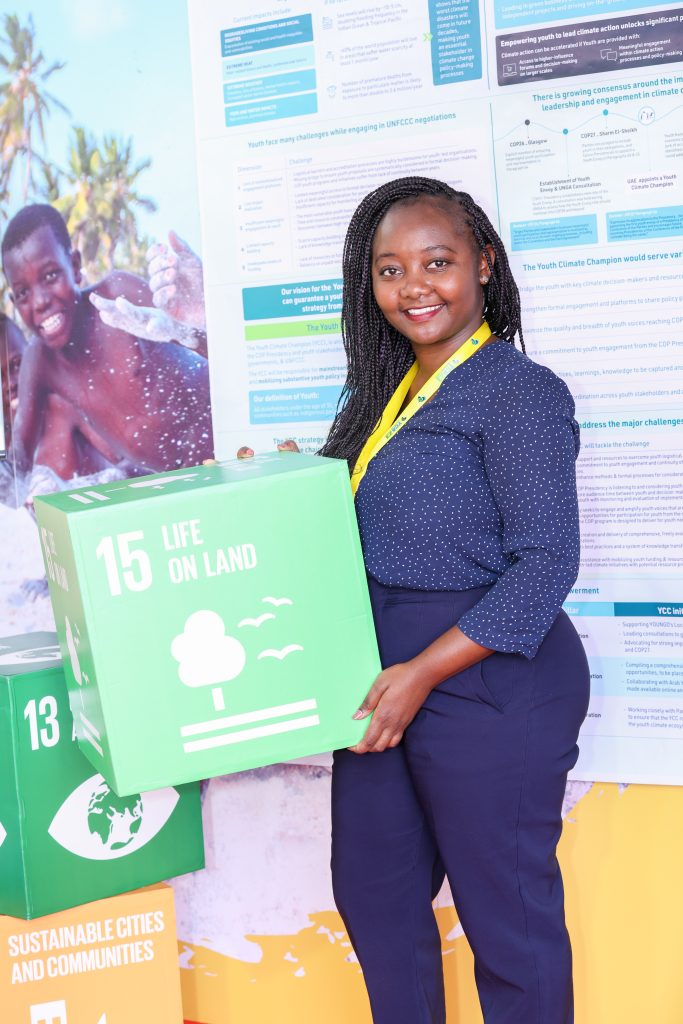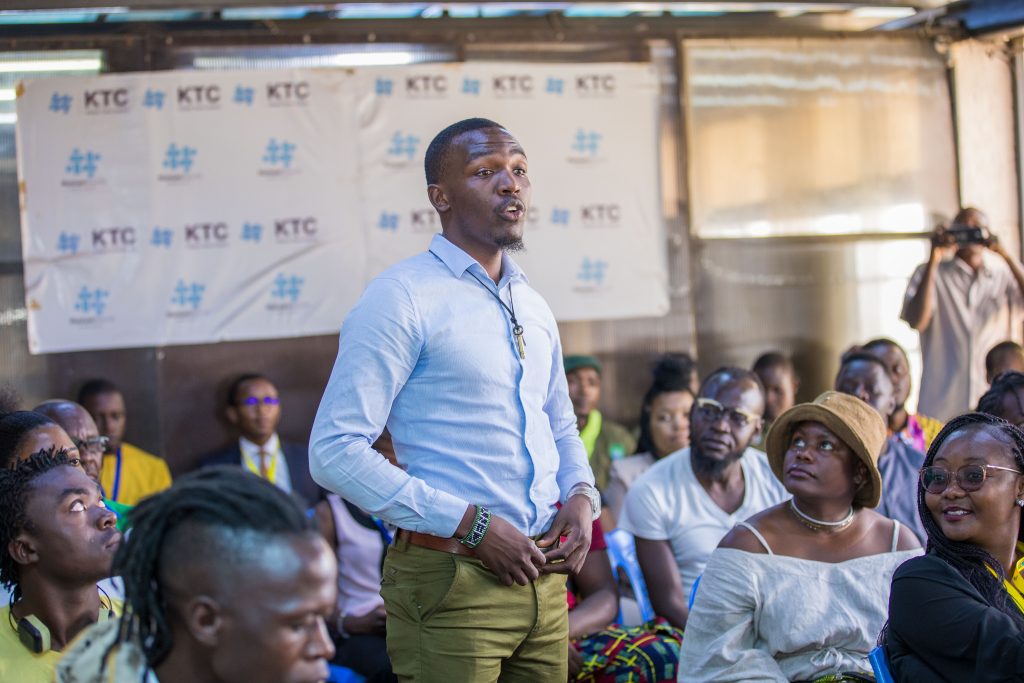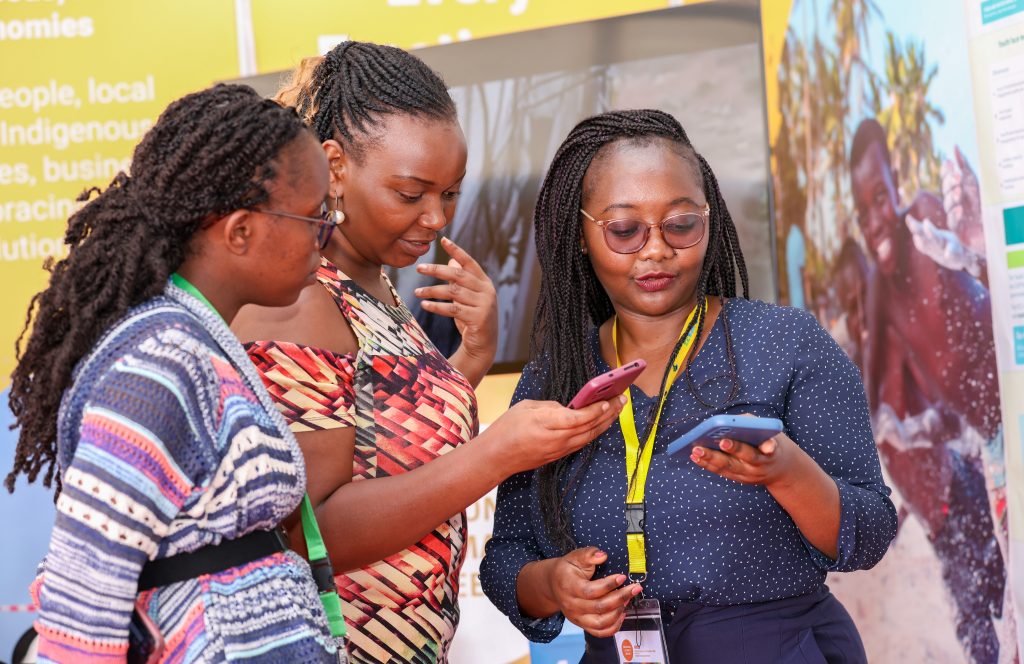
Mary Muthoni Morrison posing for a pic at YCC booth
Reflections from the Africa Youth Climate Assembly (AYCA), Africa climate Summit (ACS) and Africa Climate Week (ACW).
Most typical stories start with the ambiance – or a background voice to set the tone of the conversation. In this light, I would say that it was a cold morning, when I got squished in a line in order to attend the official opening of the Africa Climate Summit, a humbling moment indeed, similarly experienced when collecting my badge. However, the important question to ask is why was I there?
As part of the COP28 International Youth Climate Delegate Program, I was afforded the opportunity to attend the Africa Climate Week (ACW), Africa Climate Summit (ACS) and the African Youth Climate Assembly (AYCA). It was a challenging week of attending sessions, networking and getting to visualize my role in the climate space while supporting my community and country. My passion is formed from seeing the thunderous reality of climate change effects on African nations which are vulnerable. From floods, to landslides, raising temperatures and seas, all these realities are close to my heart, especially coming from a coastal community in the beautiful shores of the Kenyan Indian Ocean.
Before – on road to the ACS
It is important to point out the interesting events that took place before the summit. These events, though may be easily dismissed, should be highly considered in looking overall at the preparation of African countries’ position on the upcoming United Nation Climate Change Conference – Conference of Parties 28, (COP28).
One; there was major concern on the summit being seized by western governments and philanthropic organizations in pushing for the western narrative with others terming solutions like carbon markets as ineffective solutions. Civil society organizations urged the summit to take a significant stance for the continent and , in Kenya, published a non- state actor demands and redlines which urged for standing by the principles of climate justice, human rights, gender equality, and intergenerational equity; committing to a just and equitable transition of renewable energy; fulfilling of historical responsibility as required of developed
nations; advancing collective accountability in African leadership and African people to be put above all interests.

Kibera community youth activist, highlighting challenges young people face in line with climate change
Two; the AYCA took place for three days before the ACS. It brought together youth from different African regions and culminated in a youth declaration which simply emphasized youth recognition, participation and inclusion in the climate change space. The declaration specifically noted that “Africa has the youngest population in the world, with 70% of sub-Saharan Africa’s population under the age of 30, and that by 2030, young Africans are expected to constitute 42% of global youths, hence African continent can reap from this demographic dividend in the shaping of the green growth agenda.” However, gaps that were apparent were in the inclusion of youth from other African countries in the Assembly participation, and inadequate preparation for the assembly in terms of where sessions were taking place and access to required badges to access the venue.
During the ACS
The COP28 is right on the corner with countries preparing to participate in the party processes on the issue of climate change. Key topics in this COP include fast – tracking the energy transition, transforming climate finance, putting nature, people, lives and livelihoods at the heart of climate action, and mobilizing for an inclusive COP. The ACW is one of the regional climate weeks that took place in preparation for the COP 28. It was held from September 4th to 8th in Nairobi Kenya. The ACS happened parallel to the ACW but it ended on the 6th. The ACW had thematic focuses on Energy systems and industry, Cities, Urban and Rural settlements, Infrastructure and Transport, Land, Ocean, Food and Water, and Societies, Health, Livelihoods and Economies.
In developing a roadmap for a sustainable future, I believe that the ACS brought together African leaders, youth, communities, academia, scientists, and activists in an effort to embody the spirit of partnership, and dedication to tackle and provide solutions to climate change concerns. Because Africa is the most vulnerable to the effects of climate change and contributes the least, it must be the centre of focus in demonstrating its ingenuity, adaptation techniques, and willingness to confront the ever-increasing risks posed by climate change. Furthermore, the conference emphasized the essential role of youth in raising awareness and consistently working on climate change issues. The ACS was a clear call for swift action to ensure a greener future for current and future generations.
What happened?
The summit mostly focused its attention on carbon markets, with sessions ranging from expanding Africa’s role in voluntary carbon markets, accelerating carbon markets supply, harnessing Africa’s renewable energy potential and nature based solutions.
Participants from diverse backgrounds explored the interconnectedness of these two topics, potential of incentives derived from carbon markets and the role of communities, marginalized groups and the youth in implementing nature based solutions and policy involvement. Highly noted were nature-based solutions, such as afforestation, reforestation, and ecosystem restoration which contribute to both carbon sequestration and biodiversity conservation. Emphasis was made on having a transparent robust governance mechanism and equitable distribution of benefits especially to communities. Culminating from the series of discussions during the ACW, the Nairobi declaration was agreed by the parties.
Notably, by the time the summit was concluding, several biodiversity and nature based solutions related sessions were taking place the next few days. I believe that these sessions had invaluable learning that would have fed into the ACS.

Participating in the AYCA, ACS and ACW, provided me with an invaluable opportunity to contribute in meaningful discussions and exchange knowledge on pressing climate challenges facing the continent. With the diversity of stakeholders and participation in sessions, this shone a spotlight on the potential for innovative approaches to mitigate climate change while promoting sustainable development. Additionally, the Nairobi Declaration, with its strong commitment to climate action and financing mechanisms, sets a promising path forward for Africa though further actions need to be done. By attending the events, I gained valuable insights and strategies which will enable me to contribute to the global effort in tackling climate change, specifically in strengthening protection mechanisms on biodiversity and enhancing inclusive participation in the law and policy making process across the continent. I hope that lessons learned shall be translated into concrete actions and partnerships in the pursuit of a sustainable.
Mary is a young, and dynamic attorney-at-law with a deep-seated commitment to environment, climate and wildlife protection, as well as good governance. Her legal and advocacy work on climate and environmental sustainability have ingrained her belief in the importance of protecting the world’s natural resources and enhancing the accountability systems in place. She is the co-founder and coordinator of EcoEngage, a newly established dedicated platform that aims to increase awareness and educate individuals on environmental policies, striving to create a positive impact on nature and wildlife. She is also the legal specialist at Biophilic Conversations and